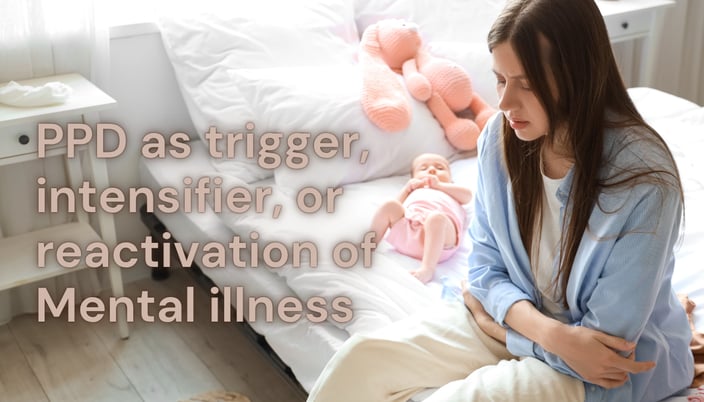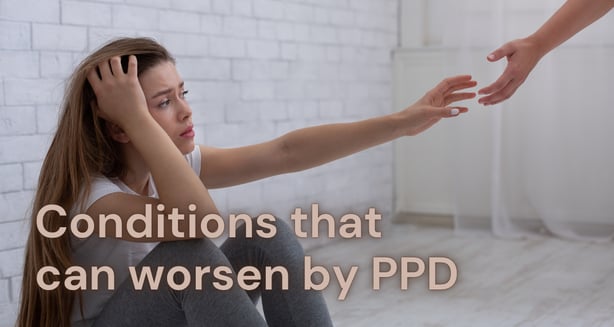How PPD Can Trigger or Worsen Existing Mental Health Conditions
7/1/20254 min read


The postpartum period is widely known for its emotional intensity—sleepless nights, fluctuating hormones, identity shifts, and physical recovery all converge into a period of profound vulnerability. For many new mothers, this phase brings a new and unfamiliar challenge: postpartum depression (PPD). But for others, especially those with pre-existing mental health conditions, the postpartum window can act as a trigger, intensifier, or reactivation of symptoms they thought were under control.
The relationship between postpartum depression and existing mental health conditions is deeply intertwined. PPD doesn't just arrive in isolation—it can amplify anxiety, reactivate past trauma, or destabilize bipolar disorder, among others. Understanding how PPD interacts with these conditions is crucial to providing effective, compassionate care.
At Peace Temple, we frequently support clients with histories of depression, anxiety, OCD, trauma, and mood disorders who find themselves emotionally unravelling after childbirth. This doesn’t mean they’re failing—it means their mind and body are calling out for more support.
The Vulnerability of the Postpartum Window
Physiologically, the postpartum period is one of the most significant hormonal upheavals a person can experience. Estrogen and progesterone levels, which rise steadily during pregnancy, drop dramatically after delivery—often within just 24 to 72 hours. These hormones regulate not only the menstrual cycle but also mood, cognition, and emotional regulation.
Add to this:
Severe sleep deprivation
Breastfeeding challenges
Physical pain or trauma from childbirth
Role adjustment and isolation
…and the result is a perfect storm for emotional destabilization, particularly in individuals with a pre-existing psychiatric history.
Conditions Most Commonly Worsened or Triggered by PPD
1. Generalized Anxiety Disorder (GAD)
PPD and anxiety often go hand-in-hand. However, in individuals already living with GAD, the postpartum period can cause a drastic spike in symptoms.
Typical signs include:
Constant worry about the baby’s health or safety
Feeling restless, keyed up, or unable to relax
Physical symptoms like chest tightness, nausea, or racing heart
Mental exhaustion from overthinking
What’s often overlooked is that this anxiety isn’t just “new mom nerves.” For someone with GAD, PPD can turn typical worry into obsessional panic, creating a loop that interferes with bonding, rest, and functioning.
At Peace Temple, we use gentle cognitive-behavioural approaches and nervous system regulation tools to help mothers manage both anxiety and depression simultaneously.
2. Obsessive-Compulsive Disorder (OCD)
For those with a history of OCD—or even subclinical obsessive traits—the postpartum period can introduce a distressing pattern of intrusive thoughts and compulsions.
Common postpartum OCD themes:
Fear of harming the baby (physically or emotionally)
Excessive cleaning or checking
Avoidance of baby care tasks due to fear of “messing up”
While these behaviours might look like caution or new parent protectiveness, they’re often driven by deep internal fear and emotional distress. If left untreated, OCD can become so consuming that it affects sleep, relationships, and overall mental health.
Peace Temple’s postpartum OCD support model offers exposure-based therapy and a compassionate space for processing intrusive thoughts without judgment.
3. Bipolar Disorder
Bipolar disorder carries one of the highest risks for severe postpartum psychiatric episodes, including postpartum psychosis. For individuals with a history of bipolar I or II, the postpartum period requires careful planning and monitoring.
Triggers include:
Hormonal crashes after birth
Sleep deprivation (which can induce mania)
Medication changes during pregnancy or breastfeeding
Symptoms to watch for:
Sudden mood swings
Racing thoughts, impulsivity, or grandiosity
Extreme fatigue alternating with high energy
Psychotic features such as paranoia or hallucinations
Unfortunately, bipolar disorder is sometimes misdiagnosed as PPD, especially if symptoms present as depression only. That’s why psychiatric history should always be part of postpartum care planning—something we prioritize at Peace Temple.


4. Trauma and PTSD
Childbirth itself can be traumatic. But for individuals with a history of trauma, the postpartum period can retrigger unresolved wounds. This includes survivors of:
Childhood abuse or neglect
Sexual trauma
Previous traumatic births
Domestic violence
The vulnerability, exposure, and physical pain associated with labour can feel invasive or violating. Additionally, the emotional demands of motherhood can reactivate attachment wounds or fear of abandonment.
Symptoms may include:
Flashbacks or nightmares
Emotional detachment or numbing
Panic attacks or hypervigilance
Difficulty trusting others with baby care
At Peace Temple, we provide trauma-informed therapy that supports healing at the nervous system level, not just symptom management.
5. Eating Disorders and Body Image Issues
Postpartum depression can reignite body shame, disordered eating, or obsessive control over appearance or weight—especially in those with prior eating disorder histories.
Triggers include:
Rapid body changes post-delivery
Comments from others about appearance
Pressure to "bounce back"
Loss of control over eating/sleeping routines
The emotional vulnerability of the postpartum period, coupled with identity shifts, can make recovery fragile. We encourage mothers to focus on nourishment over numbers, and our clinicians at Peace Temple support body-neutral postpartum healing.
The Danger of Mislabelling or Missing the Signs
Too often, new mothers with prior diagnoses are told their distress is “just the baby blues.” But when deeper-rooted conditions are misread as typical adjustment, the consequences can be severe:
Delayed treatment
Intensified symptoms
Higher risk of self-harm
Breakdowns in parenting confidence and partner relationships
That’s why our care team at Peace Temple conducts comprehensive postpartum mental health assessments—accounting not just for depression, but the entire spectrum of emotional health.
Healing and Managing Multiple Conditions After Birth
Healing isn’t about erasing all symptoms—it’s about building support systems, awareness, and emotional tools to ride the waves more safely.
What helps:
Personalized therapy that addresses both past and present struggles
Medication management that accounts for breastfeeding and hormonal shifts
Peer support from others who’ve walked a similar path
Gentle lifestyle changes like movement, mindfulness, and rest, not perfectionism
Postpartum depression doesn’t cancel out all the progress you’ve made—it simply reveals where more support is needed.
Final Thoughts: It’s Not a Setback—It’s a Signal
If PPD reactivates old wounds or worsens an existing mental health condition, it doesn’t mean you’re back to square one. It means your body and mind are under stress, and they need attention, not judgment.
At Peace Temple, we see every relapse or flare-up as a signal, not a failure. With care, compassion, and clinical expertise, healing is always possible—even when it starts in the fog.
You are not broken. You are navigating a storm, and you deserve a safe harbour.
